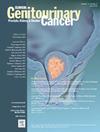新辅助PD-1抑制剂联合VEGFR-TKI与VEGFR-TKI治疗非转移性肾细胞癌的临床结果和安全性分析
IF 2.7
3区 医学
Q3 ONCOLOGY
引用次数: 0
摘要
目的:联合免疫检查点抑制剂(ICIs)和酪氨酸激酶抑制剂(TKIs)在肾细胞癌(RCC)新辅助治疗中的有效性尚不清楚。本研究旨在比较新辅助ICI + TKI联合治疗与TKI单药治疗局部RCC患者的疗效和安全性。方法:本研究纳入2019年1月至2024年2月来自全国29个中心接受新辅助治疗的185例局部RCC病(TanyNanyM0)。主要终点为所有患者和肿瘤血栓患者的客观缓解率(ORR)。次要终点包括无复发生存期(RFS)、总生存期(OS)、手术结果和安全性。对两组结果进行统计学分析比较。结果:联合治疗组的ORR高于TKI单药治疗组(所有患者30.9% vs. 16.3%, TT患者34.5% vs. 15.6%)和pCR率(14.8% vs. 0%)。接受联合治疗的TT患者RFS率有所提高(P = 0.047)。此外,联合治疗组术中出血量更低(200 mL vs 300 mL, P = 0.004)。主要的限制是回顾性研究设计。结论:新辅助ICI + TKI联合治疗具有良好的疗效和可接受的毒性。这些发现表明,有必要进一步研究以探索这种治疗方法的潜力。本文章由计算机程序翻译,如有差异,请以英文原文为准。
Clinical Outcomes and Safety Profile of Neoadjuvant PD-1 Inhibitors Combined With VEGFR-TKI Versus VEGFR-TKI in Nonmetastatic Renal Cell Carcinoma
Objective
The effectiveness of combining immune checkpoint inhibitors (ICIs) and tyrosine kinase inhibitors (TKIs) in neoadjuvant therapy for renal cell carcinoma (RCC) remains unclear. This study aim to compare the efficacy and safety of neoadjuvant ICI plus TKI combination therapy versus TKI monotherapy in locally RCC patients.
Methods
This study included 185 cases of locally RCC disease(TanyNanyM0) receiving neoadjuvant therapy from 29 centers across China from January 2019 to Feburary 2024. Primary endpoint was the objective response rate (ORR) in all patients and patients with tumor thrombus (TT). Secondary endpoints included recurrence-free survival (RFS), overall survival (OS), surgical outcomes, and safety. Statistical analysis was performed to compare the results between 2 groups.
Results
Combination therapy group had higher ORR compared to the TKI monotherapy group(30.9% vs. 16.3% in all patients, 34.5% vs. 15.6% in patients with TT) and pCR rate (14.8% vs. 0%). RFS rates were improved in patients with TT receiving combination therapy (P = .047). Furthermore, the combination therapy group had lower blood loss during surgery (200 mL vs. 300 mL, P = .004). The main limitation is the retrospective study design.
Conclusions
Neoadjuvant ICI plus TKI combination therapy showed promising efficacy and acceptable toxicity. These findings suggest that further investigation is warranted to explore the potential of this treatment approach.
求助全文
通过发布文献求助,成功后即可免费获取论文全文。
去求助
来源期刊

Clinical genitourinary cancer
医学-泌尿学与肾脏学
CiteScore
5.20
自引率
6.20%
发文量
201
审稿时长
54 days
期刊介绍:
Clinical Genitourinary Cancer is a peer-reviewed journal that publishes original articles describing various aspects of clinical and translational research in genitourinary cancers. Clinical Genitourinary Cancer is devoted to articles on detection, diagnosis, prevention, and treatment of genitourinary cancers. The main emphasis is on recent scientific developments in all areas related to genitourinary malignancies. Specific areas of interest include clinical research and mechanistic approaches; drug sensitivity and resistance; gene and antisense therapy; pathology, markers, and prognostic indicators; chemoprevention strategies; multimodality therapy; and integration of various approaches.
 求助内容:
求助内容: 应助结果提醒方式:
应助结果提醒方式:


